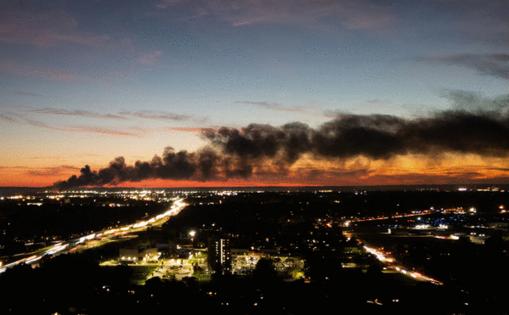Businesses, resident file lawsuit against UPS after fatal Louisville plane crash
Published in News & Features
LEXINGTON, Ky. — A Louisville resident and several businesses filed a federal lawsuit Thursday against UPS and other companies after a fatal cargo plane crash in Louisville this week killed at least 13 people.
The lawsuit claims the crash and fallout was the result of negligent and wanton conduct by UPS, as well as Boeing, which made the plane, and General Electric Company, which made the engine that fell off the plane.
The proposed class action lawsuit was filed on behalf of Shakeara Ware, who lives near the crash site, Triple D and Ensey, two businesses in the area, and any residents and businesses affected by the crash and subsequent explosion. It says the crash “upended the lives and livelihoods” of the plaintiffs.
“This tragedy has needlessly shattered the lives of many in the Louisville community. Our clients and others began their day like any other, and they are now left grappling with how and why this catastrophe could have happened. We are committed to uncovering the truth and will stop at nothing to achieve justice,” Morgan & Morgan attorneys Mike Morgan, Rene Rocha and Tanner Shultz said in a statement.
The crash happened shortly before 5:15 p.m. Tuesday as UPS Flight 2976 was leaving the airport in Louisville bound for Honolulu. It killed at least 13 people, including three UPS crew members, and injured several others. Officials continue to search for nine people missing from nearby businesses.
NTSB Member Todd Inman said Wednesday airport video showed the left engine of the MD-11 McDonnell Douglas aircraft detaching soon after takeoff.
The lawsuit alleges that the plane crash acted like a bomb, igniting 220,000 pounds of jet fuel, as well as combustible materials in surrounding locations. Because of the surrounding materials, the lawsuit alleges that multiple explosions and massive plumes of fire and smoke burst from the plane and the structures it hit, causing multiple deaths, personal injuries, and massive property damage.
Ware was home when the crash happened, and the explosion shook her home, the lawsuit says. It also filled her lungs with toxic smoke and soot, which required a trip to the emergency room.
Triple D was completely destroyed by the crash, and property owned Ensey is chemically contaminated, according to the lawsuit. Other local companies who have sustained significant economic damages.
The plaintiffs are asking for unspecified damages and relief, and a jury trial for all necessary issues, the lawsuit says.
The model of the UPS plane that crashed was a McDonnell Douglas MD-11. The lawsuit says that aircraft has the second-worst safety record of any commercial aircraft still in service.
The plane had previously undergone six weeks of maintenance in September and October in San Antonio. Texas. While in San Antonio, the plane underwent emergency repairs to a cracked center wing upper fuel tank, according to the lawsuit.
The plane also had a crack in part of its top fuselage and corrosion in part of its lower fuselage. The lawsuit says the joint failure to properly maintain the plane caused or substantially contributed to the crash.
Inman said Thursday the full maintenance history of the crashed plane will be examined to further determine what led to the crash. The plane was manufactured by Boeing in 1991 and purchased by UPS in 2006.
The engines that powered the UPS plane, CF6 engines built by General Electric, also have a history of fatal crashes, according to the lawsuit.
In 1979, a CF6 engine fell off an American Airlines jet as it was departing Chicago. The plane crashed and killed 273 people, according to the lawsuit.
The NTSB attributed the crash to improper engine maintenance. The lawsuit says similar defects in the engine on the UPS plane caused or substantially contributed to the crash.
©2025 Lexington Herald-Leader. Visit kentucky.com. Distributed by Tribune Content Agency, LLC.







Comments